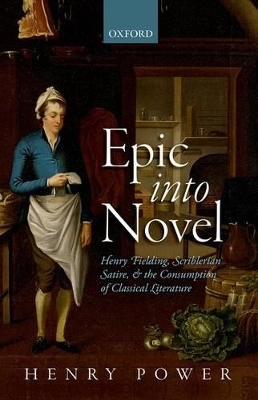
Epic into Novel
Henry Fielding, Scriblerian Satire, and the Consumption of Classical Literature
Seiten
2015
Oxford University Press (Verlag)
978-0-19-872387-5 (ISBN)
Oxford University Press (Verlag)
978-0-19-872387-5 (ISBN)
Epic into Novel examines the work of Henry Fielding alongside other key eighteenth-century writers to examine how the conflicting influences of the classical tradition and the new literary marketplace were reconciled.
Epic into Novel looks at Henry Fielding's adaptation of classical epic in the context of what he called the 'Trade of . . . authoring'. Fielding was always keen to stress that his novels were modelled on classical literature. Equally, he was fascinated by--and wrote at length about--the fact that they were objects to be consumed. He recognised that he wrote in an age when an author had to consider himself 'as one who keeps a public Ordinary, at which all persons are welcome for their Money.' In describing his work, he alludes both to Homeric epic and to contemporary cookery books.
This tension in Fielding's work has gone unexplored, a tension between his commitment to a classical tradition and his immersion in a print culture in which books were consumable commodities. This interest in the place of the ancients in a world of consumerism was inherited from the previous generation of satirists. The 'Scriblerians'--among them Jonathan Swift, John Gay, and Alexander Pope--repeatedly suggest in their work that classical values are at odds with modern tastes and appetites. Fielding, who had idolised these writers as a young man, developed many of their satiric routines in his own writing. But Fielding broke from Swift, Gay, and Pope in creating a version of epic designed to appeal to modern consumers.
Henry Power provides new readings of works by Swift, Gay, and Pope, and of Fielding's major novels. He examines Fielding's engagement with various Scriblerian themes--primarily the consumption of literature, but also the professionalisation of scholarship, and the status of the author--and shows ultimately that Fielding broke with the Scriblerians in acknowledging and celebrating the influence of the marketplace on his work.
Epic into Novel looks at Henry Fielding's adaptation of classical epic in the context of what he called the 'Trade of . . . authoring'. Fielding was always keen to stress that his novels were modelled on classical literature. Equally, he was fascinated by--and wrote at length about--the fact that they were objects to be consumed. He recognised that he wrote in an age when an author had to consider himself 'as one who keeps a public Ordinary, at which all persons are welcome for their Money.' In describing his work, he alludes both to Homeric epic and to contemporary cookery books.
This tension in Fielding's work has gone unexplored, a tension between his commitment to a classical tradition and his immersion in a print culture in which books were consumable commodities. This interest in the place of the ancients in a world of consumerism was inherited from the previous generation of satirists. The 'Scriblerians'--among them Jonathan Swift, John Gay, and Alexander Pope--repeatedly suggest in their work that classical values are at odds with modern tastes and appetites. Fielding, who had idolised these writers as a young man, developed many of their satiric routines in his own writing. But Fielding broke from Swift, Gay, and Pope in creating a version of epic designed to appeal to modern consumers.
Henry Power provides new readings of works by Swift, Gay, and Pope, and of Fielding's major novels. He examines Fielding's engagement with various Scriblerian themes--primarily the consumption of literature, but also the professionalisation of scholarship, and the status of the author--and shows ultimately that Fielding broke with the Scriblerians in acknowledging and celebrating the influence of the marketplace on his work.
Henry Power is Professor of English at the University of Exeter
Introduction: 'Modern Dinners' ; 1. 'Mackarel a Week after the Season': Swift and the Durability of Epic ; 2. John Gay's Art of Walking the Streets ; 3. Alexander Pope: 'Fragments, not a Meal' ; 4. Joseph Andrews: 'The Sanction of Great Antiquity' ; 5. Tom Jones I: 'The Cookery of the Author' ; 6. Tom Jones II: Fielding's Sagacious Reader. ; 6. Amelia: 'Talk not to me of Dinners'
| Zusatzinfo | 3 black-and-white halftones |
|---|---|
| Verlagsort | Oxford |
| Sprache | englisch |
| Maße | 146 x 223 mm |
| Gewicht | 462 g |
| Themenwelt | Geschichte ► Allgemeine Geschichte ► Neuzeit (bis 1918) |
| Geisteswissenschaften ► Sprach- / Literaturwissenschaft ► Anglistik / Amerikanistik | |
| Geisteswissenschaften ► Sprach- / Literaturwissenschaft ► Literaturwissenschaft | |
| ISBN-10 | 0-19-872387-3 / 0198723873 |
| ISBN-13 | 978-0-19-872387-5 / 9780198723875 |
| Zustand | Neuware |
| Haben Sie eine Frage zum Produkt? |
Mehr entdecken
aus dem Bereich
aus dem Bereich
Europa 1848/49 und der Kampf für eine neue Welt
Buch | Hardcover (2023)
DVA (Verlag)
48,00 €
Giordano Bruno - ein ketzerisches Leben
Buch | Hardcover (2024)
C.H.Beck (Verlag)
29,90 €


